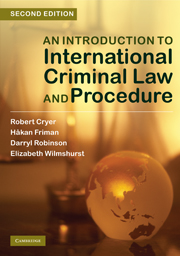Book contents
- Frontmatter
- Contents
- Preface to the Second Edition
- Table of Cases
- Table of Treaties and other International Instruments
- Table of Abbreviations
- PART A INTRODUCTION
- PART B PROSECUTIONS IN NATIONAL COURTS
- PART C INTERNATIONAL PROSECUTIONS
- PART D SUBSTANTIVE LAW OF INTERNATIONAL CRIMES
- PART E PRINCIPLES AND PROCEDURES OF INTERNATIONAL PROSECUTIONS
- 15 General Principles of Liability
- 16 Defences/Grounds for Excluding Criminal Responsibility
- 17 Procedures of International Criminal Investigations and Prosecutions
- 18 Victims in the International Criminal Process
- 19 Sentencing and Penalties
- PART F RELATIONSHIP BETWEEN NATIONAL AND INTERNATIONAL SYSTEMS
- Index
- References
16 - Defences/Grounds for Excluding Criminal Responsibility
from PART E - PRINCIPLES AND PROCEDURES OF INTERNATIONAL PROSECUTIONS
Published online by Cambridge University Press: 05 June 2012
- Frontmatter
- Contents
- Preface to the Second Edition
- Table of Cases
- Table of Treaties and other International Instruments
- Table of Abbreviations
- PART A INTRODUCTION
- PART B PROSECUTIONS IN NATIONAL COURTS
- PART C INTERNATIONAL PROSECUTIONS
- PART D SUBSTANTIVE LAW OF INTERNATIONAL CRIMES
- PART E PRINCIPLES AND PROCEDURES OF INTERNATIONAL PROSECUTIONS
- 15 General Principles of Liability
- 16 Defences/Grounds for Excluding Criminal Responsibility
- 17 Procedures of International Criminal Investigations and Prosecutions
- 18 Victims in the International Criminal Process
- 19 Sentencing and Penalties
- PART F RELATIONSHIP BETWEEN NATIONAL AND INTERNATIONAL SYSTEMS
- Index
- References
Summary
Introduction
Defences (or in the terminology of the ICC Statute ‘grounds for excluding criminal responsibility’) are an oft-forgotten aspect of international criminal law. Jurisprudence from the international criminal Tribunals on the matter is sparse, and not always satisfactory. There are a number of reasons for this, one of which also at least partially explains the relative lack of scholarly attention given to most defences in international criminal law. This is the tendency towards a lack of sympathy for defendants in international criminal proceedings. As Albin Eser has said, there are ‘certain psychological reservations toward defences. By providing perpetrators of brutal crimes against humanity … with defences for their offences, we have effectively lent them a hand in finding grounds for excluding punishability.’ Other reasons include the fact that in international Tribunals, the Prosecutor's choice of defendants rarely includes those who have plausible claims of defences recognized by the law. Defences are, however, a fundamental part of criminal law, and reflect important limitations on the proper scope of punishable conduct. It is the purpose of this chapter to set out and critique the law relating to defences, in both treaty-based and customary international law. This chapter is primarily concerned with substantive defences to international crimes, it does not deal with issues such as immunity, youth, ne bis in idem or limitation periods.
- Type
- Chapter
- Information
- An Introduction to International Criminal Law and Procedure , pp. 402 - 424Publisher: Cambridge University PressPrint publication year: 2010



